- Home
- Dave Eggers
The Parade Page 6
The Parade Read online
Page 6
The RS-80 was making its way across the bridge and Four needed to concentrate, but his mind was upended by this new outrage. Every other offense committed by Nine was somehow within the range of behaviors with adult precedent. But this, jumping in the river in the middle of a workday—a river that carried with it towering risk of infection—sent him spiraling. Now Four could dismiss him. This was a fireable offense and it proved the operation was better without him than with him. The dismissal would be brief and there could be no argument. He would allow Nine to drive the quad back to the point of origin. The company would fly him home, wherever that was. He didn’t care and didn’t want to know.
Four had crossed the bridge by now, and did not expect to see Nine again for some time. But a few minutes later, Nine flew by on the quad, head down, and in some seeming effort to appear professional, he was wearing his jumpsuit again and had discarded the purple scarf. He continued up the unpaved road until he was out of sight. Four smiled to see him disappear.
* * *
—
It was late afternoon when Four saw the first blue tarp. Amid the high scrub it emerged, looking like an oversize kite stuck in a thicket. As he got closer he saw more blue tarps, all of them being used as roofing for makeshift homes and shops in a medium-sized village. The rains were coming, Four remembered. As he approached the belly of the town, people began to walk across the road in front of him, as if the highway were already finished and he was just another motorist.
The market was alive with people and music. Silver corkscrew plumes rose from small fires. Scooters and motorcycles buzzed across the road and into the thick of the market. Four could not stop the RS-80 but could see there were countless businesses operating near the road already. His work was almost superfluous, it seemed; the unpaved road had already created this town.
One man, who was better dressed than the others, waved and motioned Four to stop. Four shrugged to convey that he could not stop, so the man walked alongside the vehicle, and motioned Four to roll down his window. Four shrugged again, indicating the window did not open. The man walked alongside patiently, and every time he caught Four’s eye, he again made a rolling-down motion. Four stared ahead, ignoring him.
Finally the man walked so close to the RS-80 that Four could see his large long-lashed eyes and his handsome but weathered face. Four took him to be about fifty. “Hello!” the man yelled, projecting his voice through the glass. “As you can see, the road is very popular already!” As the man walked, a large silver medallion danced around his sternum, hanging from a black leather strand.
Four said nothing. The man continued walking alongside the vehicle, keeping pace with Four’s window. Four had the sensation that the man had nothing in particular to say—that he only wanted to practice Four’s language and to show the other locals that he could converse with the man making the road.
“Do you need any assistance in your work?” the man asked. He gave his name but Four didn’t register it. He did not want to know this man’s name. Such men frequently offered to do odd jobs, to clear the road, to bring water, to keep people from the embankment, any number of tasks that were wholly unnecessary. Sometimes these men were genuine workers looking for an honest day’s pay. Sometimes they were hustlers looking for an angle, a bribe. Four knew that, outside microenterprise, there was virtually no source of income in the region, that it was an area of subsistence farming and sporadic employment through the nascent government.
Four shook his head and looked ahead, pretending that the paving of the road required his full attention. The man took this news in stride and continued to walk alongside the paver. They were now past the main part of the town and the roadside structures were less frequent.
“You will be finished in how many days?” the man asked.
Four looked at his screen, ignoring the man.
“How many days until you are done with the road?” the man asked.
Four said nothing.
“Excuse me,” the man said, showing no sign of fatigue or annoyance. “The road, how long until it is completed? Don’t worry. I am not one of yesterday’s rebels looking for work.”
Four held up eight fingers.
“Excellent,” the man said, walking briskly and squinting into the distance. “With a road like this, now it is possible to make plans.”
Four waved curtly, hoping he might convey an end to the interaction. Instead, the man moved closer, tapping on the window and pointing down. Four did not react.
“I heard about your concern for the boy,” the man said. He mentioned this without any inflection or apparent knowledge of how strange it would sound to Four.
“He is the son of my cousin,” the man said. “He was interested in your machine and wanted to watch it. He said you lifted him and carried him into the woods. Then back to the road.”
Four was not sure what to say. He could not plausibly deny that he had done this. He wondered if he had violated some local law or custom. It could prompt some contrived interaction with local elders or authorities.
Four stared ahead. The next day’s first pod was only fifty meters away and the sky was darkening with cloudcover. When he reached it, he had no choice but to stop. Avoiding the man would be impossible.
Now he could see that there were two teenage boys standing on top of the pod, waving to Four, as if the pod had been missing and they had located it for him. He rolled down his window and waved his arm, motioning them to get off. They did nothing. Finally the man stepped purposefully toward them, his medallion swinging wildly as he roared at them in a guttural tone utterly different than the gentlemanly one he’d been using with Four. The boys quickly jumped down and scattered.
Four nodded to the man, being careful not to thank him. Thanking him would imply that the man had performed some task worthy of compensation.
When Four reached the pod he stopped and shut down the RS-80 and, hoping to avoid the man with the dancing medallion, he stayed in the cab, pretending to check his gauges. He ducked low, almost hiding beneath the dash. When he sat upright again, the man was standing by the cab door, his hands at his hips, looking back at the road already paved.
Four opened the door and stepped down.
“Very nice work so far,” the man said. “It’s black like licorice. I have never seen such a road.”
“Thank you,” Four said.
The company insisted on ignoring locals but recommended against being rude. That could create its own complications. The balance to be struck was formidable.
“Very nice work so far,” the man said again.
Four retrieved his pack from the exterior compartment on the vehicle and spotted a location just down from the embankment where he could assemble his tent. All the while, the man followed him.
“You will be safe here,” the man said. “Tomorrow it will not be as safe. That land up ahead is more contested.” The man pointed up the road with a long tanned finger. Four was perplexed by his age. His face did not look more than fifty, and his gait was as light as a boy’s, but his hands looked like the gnarled ends of a petrified tree.
Four extricated the tent from its container, and the man watched with great interest as the tent, with a shake and a tilt, created itself. Four hoped that ignoring the man might expedite his departure, but the man showed no signs of leaving. Because he had been walking with the vehicle, and had been seen talking to Four, and because he had cleared the teenagers from the pod, in the eyes of the villagers, a few of whom were watching from a distance, the man appeared to be a kind of partner now to Four.
“I greet you,” the man said. “The people here would like to honor you with an event. It will be a very good event, with our best food. A calf will be sacrificed to celebrate your road. It will be one of my own animals, the best of what I own.”
It was strictly against company policy to be feted in this w
ay, especially in a region like this, one divided by tribal animosities. Spending time with any one tribe in an asymmetrical conflict such as this could be seen as choosing a faction, and nothing was more hazardous.
“No thank you,” Four said firmly. He realized that by speaking to the man, he was crossing a line. The last few projects Four had completed had required no speech whatsoever.
“I’m afraid the arrangements have already begun,” the man said. “It would be considered impolite not to accept.”
Four was unconvinced. He had heard this canard before. “I didn’t ask for a party. I can’t leave this vehicle.”
The man looked perplexed. He squinted into the white sky. “My people will watch the machine. No harm will come to it,” he said. Four said nothing. The man persisted. “We must be able to express our hospitality. It is part of our culture. Our pride will be damaged.”
Four suppressed a scoff. To be pressured into hospitality was no hospitality at all. “No. No. I can’t,” he said. “I have nothing to say about the pride of your people. I’m passing through. I’m doing my work. I want to be ignored and forgotten here. That’s all. Thank you,” he said. He ducked into his tent and considered zipping the door closed, but that seemed too aggressive. He lay down, put his earphones in and pressed play. He could see the man’s feet through the tent door, and eventually he saw them move away. When he was sure the man had left, he sat up and peeked his head through. The man was still there.
“Where is your other man?” the man asked.
Four had found this to be the rule: even in areas without phones, and with virtually no electronic communication network, there was always intimate knowledge of the road’s crews and their progress. This man knew about the boy and he knew about Nine. It could be presumed he knew more, too.
“He’s making sure there are no problems,” Four said. He pointed to the unpaved road ahead.
“You will soon see where much fighting happened,” the man said, looking toward the lilac horizon. “It was where the first rebel attack on government soldiers occurred. Many battles after that took place there. A region of constant atrocity. Creative atrocity. There are still rebel fragments there.”
The man played with his medallion for a moment, and then returned to the subject of Nine.
“But your man isn’t up there. When I last saw him, he was on a back road, traveling that way,” the man said, pointing at the paved road behind them.
XI
FOUR WENT TO bed early, in part to end his engagement with the man with the medallion, who hovered around his tent for an hour before leaving. Four woke at just after two to a rooster’s mad wailings. He unzipped his tent to relieve his bladder and found Nine still gone. There was no tent and no quad.
The night was quiet and soaked in black. There was no electrical grid in the region, so the nights were unsullied by human striving. Four looked up to a moonless sky, only a shard of starry space visible through the cloudcover. The rooster screamed again and Four returned to his tent to finish his sleep.
He awoke with the dawn’s bloodless light and again found no sign of Nine. He ate a breakfast of compressed nuts and dried fruit and packed his tent into the RS-80. He planned to get most of a standard day’s work done by noon, and then allow for the vehicle to cool before embarking on a second, extended session in the afternoon. Nine’s absence was emboldening. Without him, Four could complete a day and a half’s work in one.
Throughout the early morning he was relieved to see no sign of the man with the medallion. By 8:00 a.m., Four had paved five kilometers without incident. The foliage that had until then served as an emerald colonnade gave way and the land opened up into a kind of wide flat plain, devoid of trees and dotted by mounds of rusted steel—dead machines. Some were recognizable as burned jeeps and pickups. There was a downed and half-charred helicopter, its rotors limp. This was the contested area Medallion had mentioned. A pair of stray dogs were chewing at a carrion bird. High above, vultures circled, waiting for their turn. Brick buildings in the distance bore the white star-scars of artillery fire. The structures had all been rendered roofless, the jagged walls now reaching fruitlessly to the sky. Amid the destruction there was a group of young men playing volleyball. They briefly stopped to watch the RS-80 pass, then resumed. At the edge of the town, before the trees again overtook the landscape, Four saw a large black heap, gleaming in the sun. When he got closer he saw that it was a high hill of plastic garbage bags, the same sort he’d been seeing since he left the southern city. Until now he’d seen the bags alone or in groups of one or two. This small mountain of the full and jagged bags indicated a different level of organization and intent. It reminded him of the mountains of tires in rural parts of his own country. He did not know what became of mountains like this here, though, and could not imagine what kind of machine might eventually address a hill like this. Perhaps, he thought, this was to be the country’s dump.
A loud rapping startled him. Someone had struck the window of the cab. He turned to find a woman, elderly but fierce. She wore a night-blue wrap and her hair was uncovered and wild. She was walking alongside the paver, tapping his window with a long staff of polished teak. He looked ahead, waiting for her to tire and recede. But she only tapped louder.
He turned to her and shooed her away. She tapped again, and now pointed to the mountain of garbage bags. Four assumed she thought he could take care of it somehow—that the man paving the road could also pick up a mountain of trash. Did she mistake him for someone involved in waste management? He shrugged, and then pointed to the road ahead of him. He pretended to concentrate on the work again, but she walked in front of the RS-80 and waved her arms above her, trying to stop the vehicle. He flashed the machine’s headlights and waved her away. He was determined not to stop. A few feet before the paver overtook her, she stepped out of the way and strode quickly to the other side of the cab. She waved her hand wildly in front of his window and again pointed at the garbage mountain.
“What do you want me to do?” he said inside the cab. He threw his hands up for her to see. He had no role in any of that, he told her, and eventually she stopped and returned to the woods.
* * *
—
By noon Four had finished twenty kilometers, the most he’d paved in a morning, and he stopped in front of a new pod to eat and let the paver cool. There was no sign of Nine. He had spent the last few hours furious with Nine, who should have prevented the encounter with the old woman—an encounter that was highly dangerous for her and for the work at hand. Had she slipped and caught a limb under the machine, the project would be finished and the schedule unmet. He needed to do something about Nine. Something harsh, something punitive. There were no precedents for this.
Four retrieved two nutrition bars and stepped out of the RS-80. Standing on the cooling asphalt, he ate them quickly, stuffing their wrappers in the pocket of his jumpsuit. A buzzing sound wove itself into the fabric of the sky and he looked up to see an airplane approaching high above. It seemed to be following the path of the road, and when it flew overhead he saw that it was an old bomber, probably from the 1960s—one of the many secondhand planes the government had used to bomb villages in the south. Now, in peacetime, he assumed the government was keeping tabs on the road’s progress. Four was satisfied that they would see that he was on or ahead of schedule.
Chewing on a vitamin C pill, Four pictured Nine in some kind of trial. Perhaps he could be prosecuted for financial damage done to the company. Perhaps he had committed crimes back home. It was not unusual for criminals to pursue work like this—far away, far from the pursuit of police or victims. Four found these visions of Nine being tried satisfying, like a good hard itch.
In the distance Four could see a small settlement of stone and thatched dwellings, some buttressed with sheets of corrugated aluminum. The shrieks of children spiraled over the roofs and he saw the caterwaulin
g forms of two boys dart from one end of the village to the other, red dust rising in their wake. Closer to him there was a dull thump and the sound of water splashing. He turned to see a young woman bent at the waist, freeing herself from a long pole that she’d been carrying across her back to balance four jerricans full of water.
She stood and stretched her arms upward, yawning and turning her torso, and then, after these seconds of respite, she crouched again under the long pole and arranged it across her shoulders. Slowly she lifted the jerricans, but halfway to her standing, one of the jerricans, resting in a notch on the pole, began to slip, and Four found himself running toward her. The pole tilted wildly. Two jerricans slid and splashed on the ground. Four ran to her to help, and in those few seconds he saw her terrified eyes, saw her cower, saw her move away from him, saw her ready to abandon her possessions and run.
He stopped short of her and raised his hands. She stepped farther away. He tried to explain his intentions. She did not speak his language. Fool, he called himself. Something about the elderly woman had twisted his mind, allowing him to do things he knew never to do.
Now that he was close, he saw that she was far younger than he’d thought; she looked no more than thirteen. She had a long face and close-set eyes, small teeth and bright gums. She looked desperately around her, her eyes on the village in the near distance. She seemed ready to scream.
“No, no,” Four said, and backed away. He continued to retreat, his hands high above his head—he didn’t know why he was doing this—and he backed away until he reached the vehicle. He climbed inside quickly, started the engine and activated the next pod. He looked straight ahead, giving the girl time to escape unseen. When he finally turned around again she was halfway to the village, her four jerricans well balanced though she was running.

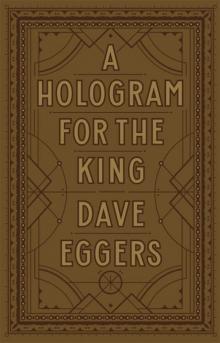 A Hologram for the King
A Hologram for the King Heroes of the Frontier
Heroes of the Frontier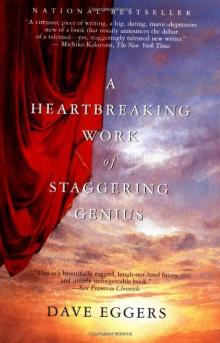 A Heartbreaking Work of Staggering Genius
A Heartbreaking Work of Staggering Genius The Best American Nonrequired Reading 2013
The Best American Nonrequired Reading 2013 How We Are Hungry
How We Are Hungry The Circle
The Circle What is the What
What is the What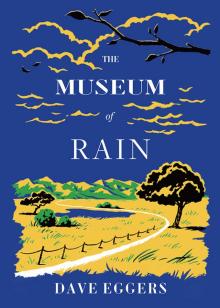 The Museum of Rain
The Museum of Rain The Captain and the Glory
The Captain and the Glory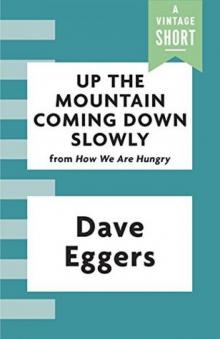 Up the Mountain Coming Down Slowly
Up the Mountain Coming Down Slowly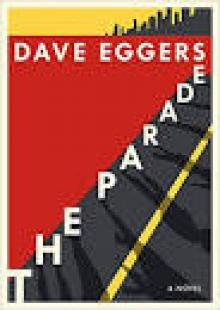 The Parade
The Parade The Monk of Mokha
The Monk of Mokha Your Fathers, Where Are They? And the Prophets, Do They Live Forever?
Your Fathers, Where Are They? And the Prophets, Do They Live Forever? You Shall Know Our Velocity
You Shall Know Our Velocity The Wild Things
The Wild Things 2006 - What is the What
2006 - What is the What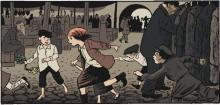 The Best American Nonrequired Reading 2011
The Best American Nonrequired Reading 2011 Created in Darkness by Troubled Americans
Created in Darkness by Troubled Americans